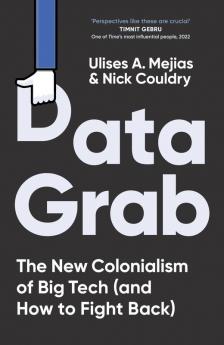English
Paperback
₹799
(All inclusive*)
Delivery Options
Please enter pincode to check delivery time.
*COD & Shipping Charges may apply on certain items.
Review final details at checkout.
Looking to place a bulk order? SUBMIT DETAILS
About The Book
Description
Author
<b>Ulises A. Mejias (Author) </b><br> Professor Ulises A. Mejias (Mexican American) is recipient of the State University of New York Chancellor's Award for Excellence in Scholarship and a Fulbright Specialist from 2021 to 2025.<br><br><b>Nick Couldry (Author) </b><br> Professor Nick Couldry (British) is a sociologist of media and culture at LSE and a Faculty Associate at Harvard University.<br><br> <p><b>If you're not paying for the product then you are the product.</b><br><br>In the past colonialism was a landgrab of natural resources exploitative labour and private property from developing countries. It made shiny promises to modernise and civilise but actually sought to control. It made native populations sign contracts they didn't understand and took resources just because they were there.<br><br>Colonialism has not disappeared it has taken a new form. In the new world order where data is the new oil big Tech companies are grabbing our most basic natural resources - our data - exploiting our labour and connections and repackaging our information to control our views track our movements record our conversations and discriminate against us. They tell us this is for our own good to build innovation and develop new technology. But in fact every time we unthinkingly click 'Accept' on Terms and Conditions we allow our most personal information to kept indefinitely repackaged by big Tech companies to control and exploit us for their own profit.<br><br>This is the era of data colonialism. The new colonial landgrab is a DATAGRAB.<br><br>In this searing cutting-edge guide two leading global researchers and founders of the concept of data colonialism reveal how history can help us understand the emerging future - and how we can fight back.</p> As in their previous work Mejias and Couldry<b> show how important it is to take the perspective of the colonized not the colonizer in explaining how the digital world is governed.</b> <i>Data Grab</i><b> offers important insights </b>into how we should analyse power and counter-power in terms of data control. I particularly recommend this book for providing examples of local and vocal initiatives across various continents. <b>A true eye-opener</b> In this <b>essential and original </b>work Meijas and Couldry lay out a <b>powerful and persuasive</b> analysis of the logical continuity between modern colonialism and the extraction of data by Big Tech and its platforms. T<b>heir call to resist data colonialism could not be more urgent or more timely</b>
Delivery Options
Please enter pincode to check delivery time.
*COD & Shipping Charges may apply on certain items.
Review final details at checkout.
Details
ISBN 13
9780753560211
Publication Date
-08-02-2024
Pages
-320
Weight
-316 grams
Dimensions
-153x234x19.32 mm








